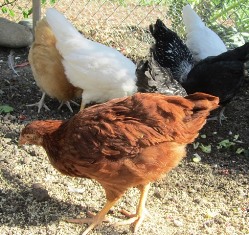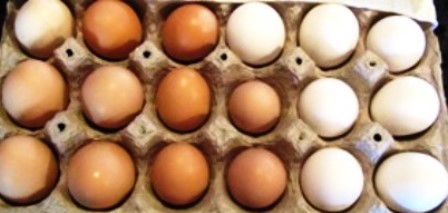If It’s Good Enough for Bill Gates, I Might Try It, Too
On Sunday mornings on our farmette, we almost always have potatoes, assorted cheeses and fresh fruit, along with homemade bread, honey, and a jar of apricot or strawberry jam that I’ve put up during jam season. But organic eggs from my free-range heritage chickens takes center stage, scrambled or poached (my favorite, a la Jacques Pépin and Julia Child), or cooked in an omelet with fresh herbs.
People who can’t eat poached, scrambled, or omelet eggs because of cholesterol concerns or egg allergies often make do without eggs or indulge their omelet craving with egg substitutes. But what about egg-free cookie dough or mayonnaise?
Enter Eco-food innovator, Hampton Creek Foods. The company’s biochemical scientists at work at the three-year-old, San Francisco-based company have come up with an egg substitute that is plant-based. It has already found a perfect plant-based recipe for egg-free mayonnaise and cookie dough.
With its egg substitute, Beyond Eggs, and other products, the company seeks to crack open an industry that produces 1.1 trillion eggs annually.
According to Katie Fehrenbacher, writing last year for Gigaom, Hampton Creek Foods CEO Josh Tetrik says “the food industry is broken.” See, http://gigaom.com/2013/09/11/hampton-creek-now-selling-plant-based-eggs-at-whole-foods-in-california/
Hampton Creek touts its plant-based, egg-free formulas as cheaper, healthier, and more humane. With its emphasis on food technology, Hampton Creek has attracted interest and funding from Silicon Valley venture capitalists and the world’s super-wealthy billionaire Bill Gates and Li Ka-shing, Asia’s richest man.
Earlier this year, Forbes writer Ryan Mac discussed Hampton Creek’s food technology venture that has attracted the interest of Yahoo co-founder Jerry Wang and Li Ka-shing. See, http://www.forbes.com/sites/ryanmac/2014/02/17/egg-replacing-startup-hampton-creek-foods-raises-23-million-from-asias-richest-man-and-yahoo-cofounder-jerry-yang/
In California, foodies can find Hampton Creek’s Beyond Eggs at Whole Foods stores. Those who love the real thing can buy eggs labeled as organic, produced by pastured free-range flocks.

A Rhode Island Red forages with a Buff Orpington, two White Leghorns, a Black Sex Link, and two Silver-laced Wyandottes
According to tests conducted by Mother Earth News,the eggs from free-range pastured chickens have more beta carotine, vitamin A, vitamin E, and Omega-3 fatty acids with less cholesterol and less saturated fat than most store-bought eggs from chickens that weren’t pastured. See, http://www.motherearthnews.com/real-food/free-range-eggs-zmaz07onzgoe.aspx#axzz3CB01GPlj
Sunday mornings on the farmette wouldn’t be the same without fresh eggs from the hen house, but if Bill Gates likes Hampton Creek Foods’ products, I might just give them a try. Still, I’m having a hard time imagining how the taste of an egg substitute from a yellow-pea and canola concoction could rival an organic egg.
Eggstra Confusing Egg Labels
Just because an egg is organic and from a cage-free chicken does not mean the eggs are free from Salmonella Enteritidis (the bacteria that causes the foodborne illness) or that the chickens producing the eggs live free of confinement.
Supermarkets carry dozens of eggs with labels like pasteurized or organic and also free-range, cage-free, or vegetarian. Consumers can find it confusing, so here’s the low-down on eggs and their labels.
CAGE FREE
This term relates to how the chicken is confined. The chickens are not raised in cages but may be confined in barns with floors. The floors may have pine shavings or other material and the chickens will likely have nesting boxes in which to lay eggs and roosts. But cage free does not necessarily mean they have lots of space; they could be living in close confinement with many other birds, depending on the farm.
ORGANIC
In order to get the USDA certification for organic on the eggs, the chickens must not be given hormones, antibiotics, and other drugs. The hens can be caged or otherwise confined, but usually they are cage free and eat an organic diet. The USDA stipulates that to qualify as organic eggs, the layers must be fed an organic diet of grains from land deemed free from toxic chemicals and pesticide for a minimum of three years and no grain from genetically-modified crops.
FREE RANGE
Chickens considered free range are able to leave their confinement and roam freely. Depending on the farm, the birds may be under a protective covering like a canopy. This keeps the flyers from escaping and the hawks from carrying away the birds. Free-range chickens might have a richer diet, again depending on the farm, because of greater access to freely foraging on grasses, grains, and seeds.
VEGETARIAN
How, you might wonder, can a chicken be deemed vegetarian when they naturally forage for grubs and worms? They are confined in cages and fed a vegetarian diet, free of animal and fish by-products.
PASTEURIZED
The eggs containing a pasteurized label have been put through a heating process while still in their shells. For three and one-half minutes, the eggs are heated to 140 degrees Fahrenheit, thereby killing the Salmonella bacteria. Pasteurized eggs are preferable for the diet of young children, elderly people, and those who have weakened immune systems and for whom a salmonella infection might have grave consequences. Even if you don’t buy pasteurized eggs, you can eliminate the risk of Salmonella infection if you cook the egg yolk and white until firm.
SAFETY TIPS
Eggs collected from your hen house should be washed within 36 hours of being collected and immediately refrigerated at 45 degrees Fahrenheit or below. These two steps can reduce the risk of Salmonella. Refrigeration prevents the bacteria (if present) from multiplying. Eggs purchased from the store should be immediately refrigerated. And if a recipe lists a raw egg as an ingredient (for example, mayonnaise or salad dressing or cake frosting), use pasteurized eggs or egg whites.
An egg from a pasture-raised hen is much more nutritious than an egg from a large commercial enterprise, according to Mother Earth News. The publication did a study in 2007 that measured how eggs from pastured hens stack up against the USDA’s nutrient data for commercial eggs. The results suggested that eggs from the pastured chickens were nutritionally superior. For the full story, see, http://www.motherearthnews.com/real-food/tests-reveal-healthier-eggs.aspx
• 1/3 less cholesterol
• 1/4 less saturated fat
• 2/3 more vitamin A
• 2 times more omega-3 fatty acids
• 3 times more vitamin E
• 7 times more beta caroten
It might be time to acquire a few more chickens if you love eggs as much as I do, especially in those big, mid-day farm table breakfast/lunches, with fresh veggies from the garden, and homemade bread and jam.
 Facebook
Facebook Goodreads
Goodreads LinkedIn
LinkedIn Meera Lester
Meera Lester Twitter
Twitter






